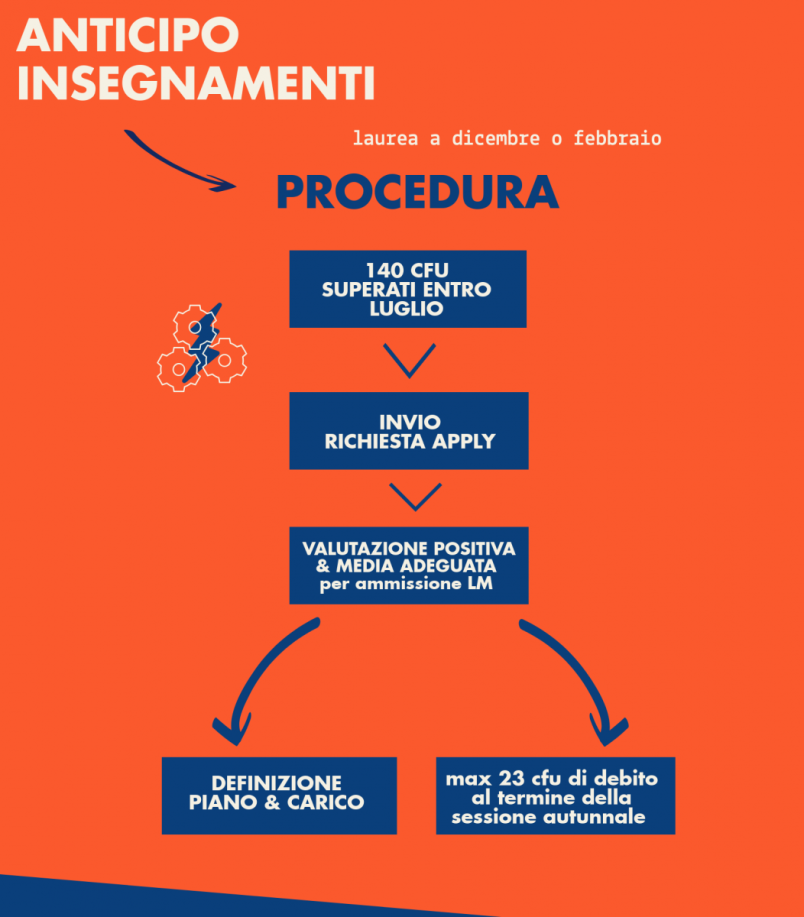
Below are the rules for enrolment in the Master's degree programme in Landscape architecture for applicants coming from Politecnico di Torino.
Possession of the curricular requirements for admission to the Course of Study is automatically verified for those who hold a Bachelor's degree or Master's degree from courses in the following degree classes:
D.M. 270/04:
L-17, Scienze dell'architettura;
L-21, Scienze della pianificazione territoriale, urbanistica, paesaggistica e ambientale;
L-23 Scienze e tecniche dell'edilizia;
L-25 Scienze e tecnologie agrarie e forestali,
LM‐4 Architettura e ingegneria edile.
D.M. 509/99:
Classe 4, Scienze dell'architettura e dell'ingegneria edile;
Classe 7 Urbanistica e scienze della pianificazione territoriale e ambientale;
Classe 20 Scienze e Tecnologie Agrarie, Agroalimentari e Forestali.
Fulfilment of the curricular requirements for access to the Course of Study is also automatically verified for those who have obtained a Bachelor's degree in other degree classes in Italy or abroad provided that they have acquired at least 45 CFUs in the following scientific-disciplinary sectors:
AGR/02 – Agronomia e coltivazioni erbacee
AGR/03 – Arboricoltura generale e coltivazioni arboree
AGR/04 – Orticoltura e floricoltura
AGR/05 – Assestamento forestale e selvicoltura
AGR/08 – Idraulica agraria e sistemazioni idraulico-forestali
AGR/09 – Meccanica agraria
AGR/10 – Costruzioni rurali e territorio agroforestale
AGR/11 – Entomologia generale e applicata
AGR/12 – Patologia Vegetale
AGR/13 – Chimica agraria
AGR/14 – Pedologia
BIO/03 – Botanica ambientale e applicata
BIO/07 – Ecologia
GEO/04 – Geografia fisica e geomorfologia
GEO/05 – Geologia applicata
ICAR/06 – Topografia e cartografia
ICAR/07 – Geotecnica
ICAR/12 – Tecnologia dell'architettura
ICAR/14 – Composizione architettonica e urbana
ICAR/15 – Architettura del paesaggio
ICAR/17 – Disegno e rappresentazione
ICAR/18 – Storia dell’architettura
ICAR/20 – Tecnica urbanistica
ICAR/21 – Pianificazione urbanistica
INF/01 – Informatica
ING-INF/05 – Sistemi di elaborazione delle informazioni
Within the limit of 10 cfu the Course Coordinator may deem the curricular requirement to have been met with the indication of any tied courses; if the number of missing credits is greater than 10 cfu the assessment will be subject to final approval by the Course Coordinator or Vice-Coordinator.
Any curricular integrations identified by the evaluator must be filled prior to enrolment in the Master's degree programme.
In order to make up the curricular integration, in the event that it is less than or equal to 60 credits, students must enrol in the in Single course enrolment for unfulfilled curricular requirements and subsequently attend the courses and sit the relative exams; this enrolment may only include in the annual personal study plan the courses assigned by the evaluator as an unfulfilled academic requirement.
Passing the admission test (interview) will allow, exclusively for those who have to complete the curricular integration, access also to the academic year following the one for which the admission test was taken (in any case after passing the exams relating to the curricular integration).
Once the curricular requirements have been met, the methods for verifying the adequacy of personal preparation are as follows:
Verification of weighted average marks
Admission test (interview)
1. Verification of weighted average marks
Candidates for whom the weighted average(1) of the examinations is greater than or equal to 24/30 regardless of the number of years taken to obtain the qualification are eligible, without the need to pass the admission interview, after having submitted their application via the Apply procedure.
The weighted average is calculated on all credits with a grade in thirtieths acquired and useful for obtaining the degree without any rounding.
In the case of career shortening, the calculation of years must be increased in proportion to the number of CFUs validated (10-60 CFUs =1 year, etc.).
(1) the weighted average is obtained by summing (grades x credits) / sum of credits.
2. Admission test (interview)
In the event that personal suitability is not met by means of the weighted average test, as described above, an admission interview is scheduled.
The outcome of the admission interview will be announced on the personal page of the APPLY procedure.
Considering that you can submit your application for admission to a Master's degree programme after having earned 140 credits and that the average and duration requirements could change by the time you actually earn your Bachelor's degree, you have the possibility to take the interview for a merit-based evaluation in order to fulfill the academic performance requirements. You can do so even if you are eligible for direct admission on the date of application submission.
Politecnico gives you this opportunity so that you have an additional chance to be admitted if your average grade decreases or your time to graduation increases.

If you are a Bachelor’s student at Politecnico di Torino and you are going to graduate after the September 2024 graduation period (December 2024 or February 2025), it is possible to include courses in the annual personal study plan of the 1st semester of the 1st year of the Master's degree programme through the credit advancement procedure if the following requirements are met:
- entry requirements for the chosen Master's degree programme (curricular requirements, suitability of personal preparation);
- at the end of the autumn examination session (September), you only have a maximum of 23 credits still unearned* (including the English language exam and the Final essay) before achieving your Bachelor’s degree, and you have maintained the average grade required for admission, or, you passed the merit evaluation/admission test/interview..
If you do not yet have the language certification, you can still submit your career evaluation request and request advances even if the warning “Language requirements not met” appears.
Please note:
- it is possible to advance courses only once during the Bachelor's degree programme. Once advanced, the Master's degree courses will remain in the APSP until the Bachelor's degree is awarded, but it will not be possible to add new courses to be advanced;
- advanced courses (attended but not passed and/or passed and registered) will be reversed to the career of the chosen Master's degree programme;
- you can only advance first-semester courses belonging to the first year of a Master’s degree programme;
- if you pass the English language exam by September, the English exam credits will not count among the 23 unearned credits;
- any internship, if it was included in the Annual Personal Study Plan of the academic year preceding the one for which you are applying, will not fall among the 23 unearned credits, provided that the internship is registered in your trasncript by 31st December.
- If you included some Master’s courses in your APSP but at end of the September examination session you still have more than 23 unearned credits these courses will be deleted from your APSP. You need to apply again for admission in the next academic year and wait for a new evaluation of the Admissions Committee.
- to those who will have placed advances in the APSP, but will lose the average requirement, in the event that they have not received a positive portfolio evaluation these courses will be removed from the APSP. For access to the new academic year, it will be necessary to reapply through the Apply procedure and pass the admission test.
- those who will lose the suitable academic performance, in case they have failed the admission test, will not be able to enter the Master's degree programme;
- If you advanced some of your Master’s courses but you do not earn your Bachelor’s degree by the end of the February graduation period, you will be able to take these exams in the Summer and Fall examination sessions.
Those who are enrolled in the Bachelor's degree programme for the fourth or fifth time and who will lose the suitable academic performance, if they have not passed the admission test, will not be able to enter the Master's degree programme.
Procedure
- Send the application for admission to the Master's degree via the Apply@polito platform by the deadline;
- Wait for the positive evaluation for admission to the selected Master's degree programme;
- log into the personal study plan/annual personal study plan portlet on the personal page: the Master's degree courses to be advanced will appear in the list of exams that can be included in the annual personal study plan, marked in violet (in the personal study plan the courses will not be present) and must be included in the annual personal study plan by the deadline.
For information regarding the creation of the personal study plan/annual personal study plan, please refer to the "Create your APSP" section of the A.A. 2024/25 Student Guide.
Once a positive assessment has been obtained, those who do not proceed with the advancement of the Master's degree courses in the academic year for which they have applied for admission must re-apply through the Apply@polito platform for admission in subsequent academic years.
Those who have advanced courses and do not proceed with enrolment to the Master's degree programme in the academic year for which they applied will have to re-apply through the Apply procedure to enrol in subsequent academic years.
PLEASE NOTE: having anticipated the Master's degree courses does NOT mean that you will automatically be enrolled in the course once you have obtained your first-level degree: enrolment must be completed from the Apply@polito platform's EVALUATIONS section by respecting the deadlines (see deadlines section).
.
The commission for the evaluation of personal preparation for the admission to the master's degree program in Urban and Regional Planning is appointed by Rectoral Decree.
Those with disabilities or specific learning disabilities (DSA) may request appropriate support by contacting via ticket the staff of the Special Needs Unit that manages student support services.
In the event that the need to fill curricular supplements is identified, for the purpose of enrollment, any eligibility acquired as a result of passing the admission test (interview) will be held until the following academic year.
Those who have obtained eligibility, whose need for curricular additions has not been identified, and do not proceed with enrollment or advancement of the Master's degree teachings in the academic year for which applied, will have to re-apply through the Apply procedure and take the admission test again for admission in subsequent academic years.
Admission test results will be published on the Apply personal page - “ Evaluations” section.
Admission Test
In the event that the average requirement is not met, there will be an interview with a specially appointed committee that will decide on the possibility of admission. The interview will focus on the following fields of knowledge
- landscape architecture, with particular reference to the design of urban open space
- landscape history and culture;
- plant ecology.
Place, date and time of the test are published in the deadlines section
The result of the test will be announced by the deadline indicated in the deadlines section